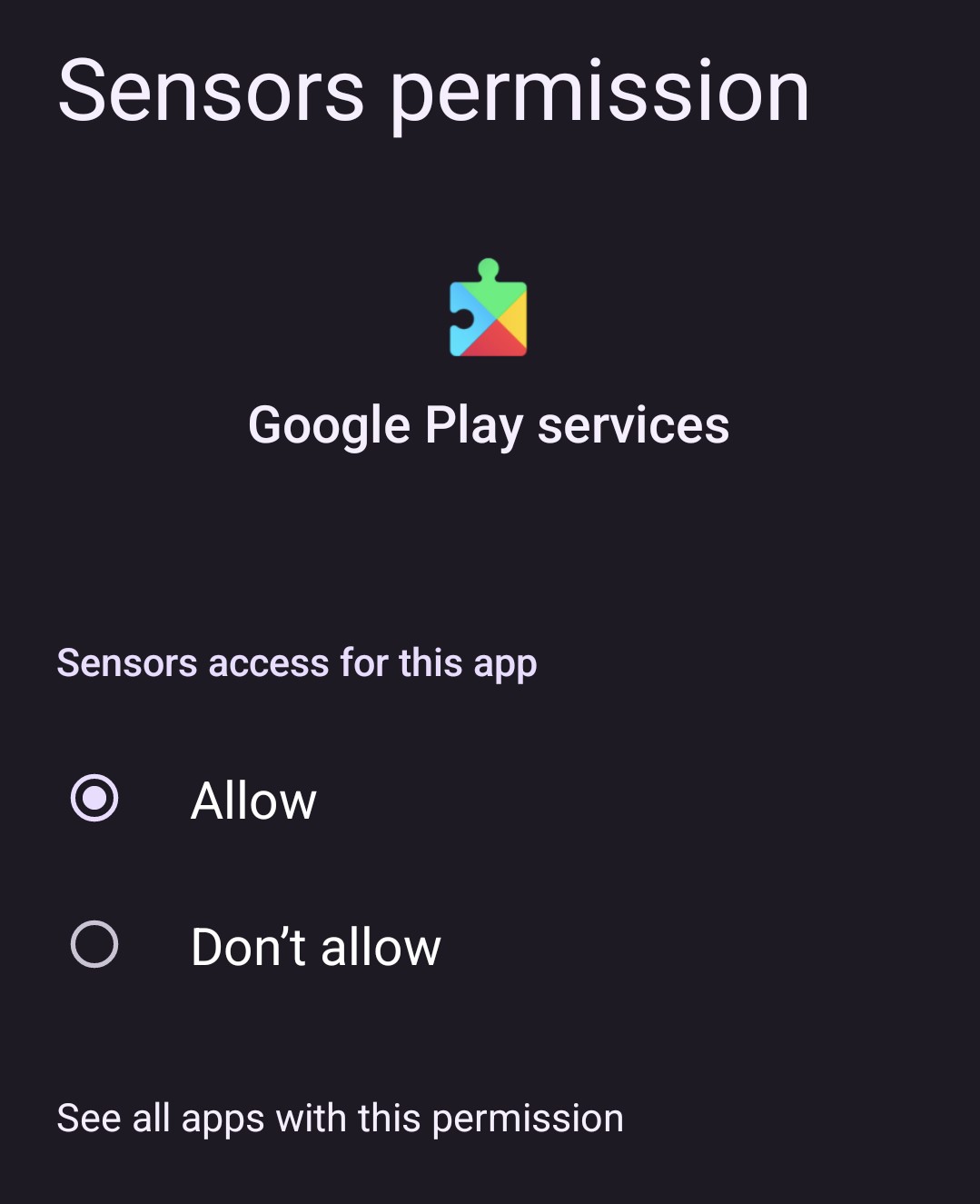Seriously. I don’t want to install something on my phone when the dev is just using a WebView, if that’s what it’s called. When the app is basically just a website with the browser hidden.
What’s the reason for that? To attach the customer? To sell the app for money? Is there more ad revenue that way? Do you reach more people?
(Are there any good reasons for it, too? Security, maybe?)
If they have an app they can gather far more personal data from you (and your device) that they can then turn around and sell
This exactly. Just ask for some location rights in the app and get access to wifi also.
Most users don’t mind giving an app a large amount of access and in doing so, a lot of personal information gets exposed.
If you have a choice, use a website.
Hell apps can gather a lot of info without actually asking for permissions
For example the accelerometer can be used without permissions
Not on GrapheneOS :)
How do you know? I mean what makes you say that?
Sensors permission toggle: disallow access to all other sensors not covered by existing Android permissions (Camera, Microphone, Body Sensors, Activity Recognition) including an accelerometer, gyroscope, compass, barometer, thermometer and any other sensors present on a given device.
I’m surprised that’s not commons behaviour now, just look at what people are doing in research papers. With enough of that data, they can figure out quite a lot about you and your life.
Very cool. I just checked Lineage OS and it looks like Google Play Services doesn’t let you disable sensors permission. Can you do it on Graphene OS? Lineage lets you control it on all apps except Google Play Services it looks like, which would actually be one of the top apps to disable it on imo.
I just checked Lineage OS and it looks like Google Play Services doesn’t let you disable sensors permission. Can you do it on Graphene OS?
Yep, there’s a toggle to disable by default globally. I also individually checked Google Play Services, Google Play Store and Google Services Framework, and all three can be denied the Sensors permission.
This is due to Sandboxed Google Play: “GrapheneOS has a compatibility layer providing the option to install and use the official releases of Google Play in the standard app sandbox. Google Play receives absolutely no special access or privileges on GrapheneOS as opposed to bypassing the app sandbox and receiving a massive amount of highly privileged access. Instead, the compatibility layer teaches it how to work within the full app sandbox.”
GrapheneOS allows you to turn off sensors (accelerometers) by app
Even Google Play Services and other system apps?
 Yep!
Yep!
Also it adds a link to their website right on your phone.
It also has all the UI/UX stuff preloaded making everything feel snappier.
making everything feel snappier.
We use very different apps that could easily be websites.
And far fewer people have adblockers that block ads in apps.
Another reason is that they can more easily send push messages to the user.
So they can make your phone go bingedybeep and show you more adverts, while slurping up any data the browser doesn’t usually let them access.
This, and also so they can avoid your plugins that kill browser tracking for ads and shit.
And you know the rest of the reasons when at the first start your minesweeper app needs to have access to your photos, location, camera and microphone.
Ad revenue. It is harder to block ads on mobile than it is on desktop.
Especially in an app rather than a mobile browser.
Heck all the features of YouTube premium? Are available for free in firefox
plus all that sweet user and device tracking data.
Yeah this too. Ads and telemetry. Those make money.
More like gathering user data they can sell
most apps are just websites wrapped inside a container and made an app.
Why?
Because they dont want you to use the actual website.
why?
Cause your browser gives you a LOT of protection against invasive data mining/profiling/tracking/etc.(Not saying its perfect, We all know about fingerprinting and HTML5 canvas tracking and what have you…but its a LOT better than the information that apps can steal)
Data mining/profiling/tracking/etc that these companies want to do to you, because you are a product to them, not a customer.
And how do they do that with an app?
Permissions.
Ever wonder why your pizza ordering app has to have access to your contacts, data storage, camera, microphone, etc etc etc? Its not because its needed for you to order pizzas. Hell, you can do that on a website with no permissions, so why is it needed for an app on your phone?
So they can steal/mine your data for profiling/tracking/marketing/being sold to others/etc.
Some people are missing the forest for the trees here
Having a businesses app on your phone is better regular advertising than anything they could ever pay for.
They just want an excuse to make you look at their logo and think about their business as regularly as possible
This is true
people tend to develop liking or disliking for things merely because they are familiar with them
and it’s amazing that basic psychological principles have been decoupled from mainstream awareness of marketing tactics (obviously intentionally).
This is not a problem with the olauncher
Thanks I’m trying that
Lemmy has a real problem with this. It’s like all of the angry people from Reddit came here and now we just have an angry circlejerk about anything the crowd doesn’t like.
Username checks out
We had a project once that ran completely fine as a website except for the ability to scan bar codes. That one thing forced us to create an app and the rest of the app was just showing the website.
Can’t you use camera on browser? I actually seen a project that does some complex things using camera [1] and it ran in browser. I’m confident scanning bar codes is possible.
https://serratus.github.io/quaggaJS/ and whatnot exist. Any reason why such an approach couldn’t be taken?
There are JS barcode libraries out there, some better than others, some free, others paid. A few years back at a corporate job I built just the thing - a web app designed to replace a 3rd party mobile app. The back-end was Laravel + various AWS services, with a responsive front-end made with Tailwind.
The requirements were to make it mimic most of the mobile app’s functionality. There was also location tracking via browser APIs (to track the cargo at all times) and a barcode scanner. I used a paid library for that, and it was quite expensive, but very reliable. So it can definitely be done as a web app.
There’s no one single answer to this. Some have been mentioned in other comments, but it’s a combination of a few different things:
- Control: They have much more control over your experience as a native app than a web app.
- Ad revenue: It’s significantly harder to block ads coming through the built in web views, and/or they can just build them in natively which is even harder.
- Integration: it’s easier to do IAPs or subscriptions through native controls, which means less resistance, which means people are more likely to end up doing it.
- Data: it’s easier to hoover up user data via native APIs than through the browser. There’s way more accessible, especially if you can ask for a bunch of permissions and people don’t notice/care. This makes any user tracking they do way more effective and any data they sell way more valuable.
- Notifications: Recently browsers have started adding support for this but it’s not as effective. Push notifications are a huge boon to user engagement and this is a huge money maker. Having native notifications is a huge sell in this equation.
- Persistence: If you have your app on a user’s phone, it ends up in the list of apps, meaning they pass by it very frequently. It’s basically free advertising and living in their head without them even noticing. This is especially true on iOS where basically all of your apps are in your face all of the time.
- Performance: Native apps run way better and can look way better than web sites. If you just use web views this is mostly moot but still may make a small difference.
I’m sure I’m forgetting a few but you get the idea.
Websites are basically just inferior versions of native apps, and even if you use a hybrid/web view approach, you get many of the benefits and have the option to “upgrade” to a real native app later.
That being said, I fucking hate this shit. I don’t agree that companies should do this, but it hands down does make financial sense. In a society entirely driven by capital and profit, it makes sense, but from a consumer perspective, it fucking sucks. I don’t want to have to install the Facebook app to see some small businesses “web site” that’s really just a Facebook page. I don’t want to install reddits shitty native app to read more than 2 comments off a post about a solution to my problem.
It’s legitimately consumer hostile, but company profits are more important than people in our society.
I think there’s a big one that you’ve missed and it’s that most people are not like most people here. Believe it or not there are many people out there whose first instinct is to search their app store for what they want. They walk among us.
If I’m McDonald’s, and a significant number of my customers search for me and instead get KFC and Burger King as top results with no McDonald’s app in sight, it’s seen as a marketing problem.
This is spot on. We recently had to do this to one of our products and I didn’t want to at all, but we could do push notifications reliably that worked for both Android and iOS.
So we had to package it as an official app :(
We have a website application and we don’t have a mobile app. At least once a week we get a support ticket from someone asking why we don’t have an app.
We reply that the site is fully responsive and to just use the site through their mobile browser. But people don’t like this. They want an app.
People are morons but some non technical ones seem to genuinely prefer an “app” even if it is just a web view hybrid one.
We’ll probably have to cave and provide it eventually.
-
the free ad space on your home screen. Sure it’s a small ad, but you see it all the time.
-
notifications. Even if only a small fraction of users allow them, it’s a lot of free advertising. And yes, you can put notifications on websites, but that’s not as reliable or as expected as native app notifications.
-
permissions. The more legitimate apps may provide some sort of additional functionality that their website can’t provide on its own. The shadier ones sell the data they get from the sensors all over your phone.
-
data storage. Technically web storage is a thing, but it’s definitely not something you want to hang your whole business on right now.
-
integrations. You can integrate, for example, Google Pay/Apple Pay on a website, but it’s more of a hassle. In an app, it’s practically drop-in. Same with the share functionality.
-
why not? If you already have a mobile site and can make an app from it reasonably easy, there’s no reason not to. You’ve become multi-channel with no extra work.
There are probably other reasons, but those are the ones that make sense to me, being in the industry.
Excellent points. I’d just add one more: user friendliness. The average user prefers to click on an icon on their screen, rather than open a Web browser and either type in the URL or access bookmarks, which tends to be rather clunky on a phone.
Great observation. Yes, absolutely.
Also capabilities. Some things are a hassle that doesn’t always work as expected (e.g. camera) and some things are just not possible at all (NFC). Even your airline app that simply shows a barcode that you scan at the gate will want to increase display brightness while it’s doing so and be able to show you a notification when you have delay or gate change…
Indeed. I called this “permissions,” but “capabilities” is a much better word for it
-
All I see are people talking about consumer apps that could be websites, but it’s a problem in the business world, too. My small business makes a service for other small businesses and all our big competitors use apps for their system while we use a web app. Some even restrict to only iOS or Android, too. It blows our potential customers’ minds when they see that ours is just a website with at least as much functionality as the competition and the ability to access it from anything.
I have no idea why anyone would do it differently as it’s WAY easier/cheaper to maintain this website than deal with app ecosystems. And there simply aren’t enough users in this space to merit data scraping like with consumer apps.
They want to wall some of their content off so it’s not easily harvestable on the web by competitors. But most of all, they want to have full control of your user “experience” so you can’t use browser extensions (like ad blockers). It’s all about money and control.
To spam you with ads and steal more of your data of course! Look at the insane permissions on these apps: There’s no reason for them to have access to your contact list, text messages, app manifest, etc. The vast majority of apps have wildly unnecessary permissions because it gets the companies more of your data.
I want apps to be apps again.
On my desktop I have browser tabs for WhatsApp, messenger, Skype, gMailChatTalkHangouts and slack. I know slack’s app was ass but I miss the rest.
I want a discrete app that doesn’t crash with chrome and which sits in my tooltray so I don’t have to fucking search for it whenever something makes a noise (ctrl-alt-a). I want to see it from the blink in the corner and not by scanning 31 windows of 7 groups of 12 tabs each.
Often times I just give up and hope it also makes my phone spork too so I can grab it there.
Progressive Web Apps were supposed to marry these schools of thought, but maybe we hoped for too much because it’s still
garbageChromium under the hood.Just make everything for maximum interoperability I guess? I recently saw and forgot the name of a system for creating and displaying Github-like pull requests and associated discussions that are sent in via email. A very simple web interface displaying plain-text that could reasonably have been extended any way you like. I am beginning to see the appeal of the plain-text revolution.
Just add them as PWAs using a browser you don’t usually use (e.g. Edge), that should give you everything you’re asking for.
I want apps to be programs again*
From a technical point of view, it sometimes makes sense:
- access to more interesting API
- guaranteed persistent storage
- no compatibility issues (different browsers, settings, extensions, etc.)
Of course, that’s just what could be done easier with an app. There’s also some less interesting points:
- giving less control to the user
- accessing more things than needed
- making the experience worse by hooking every single events out of the webview
So… the answer is “because”.
I would say in some cases, people are conditioned now to expect an app, even if it’s basically a website. I think in a mobile context, most non-techy people don’t normally think to open up a browser and say, browse Amazon or something. Instead they go for the Amazon app on their phone, and browse/shop/whatever there.
I wouldn’t say this is exclusive to phones either. I once worked on a product that was essentially web-native, but they had to ship a desktop app because their market expected it, even though it was only a web-view wrapper to the website. No offline storage, no difference in behaviour, or need for some specific API; nothing. I guess you try explaining to boomers that a web-view desktop app is unnecessary.
The data vacuuming and additional marketing are just added benefits for the app developer, if they go down that path (they usually do).
Sometimes they can get more data out of your phone through an app then through your default browser.
Or feed you more ads.
















